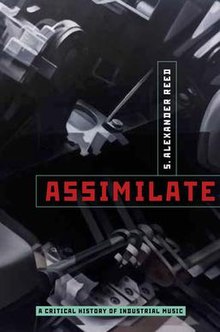
Summary
Assimilate: A Critical History of Industrial Music is a 2013 book by S. Alexander Reed, published by Oxford University Press,[1] and bills itself as "the first serious study published on industrial music."
 First edition cover | |
| Authors | S. Alexander Reed |
|---|---|
| Country | United States |
| Language | English |
| Subject | Music, Industrial music |
| Publisher | Oxford University Press |
Publication date | 2013 |
| Media type | Print (Paperback) |
| Pages | 376 |
| ISBN | 9780199832606 |
Synopsis edit
The book is an attempt to chart the history of industrial music as a genre from its early influences (including art music, Italian Futurism, Situationism, and the works of Antonin Artaud and William S. Burroughs) to the present day (including its connections to political radicalism, the gothic subculture, and dance music).
The book is divided into five parts:
- Technology and the Preconditions of Industrial Music
- Industrial Geography
- Industrial Musical Style
- Industrial Politics
- People and Industrial Music
The foreword is written by Stephen Mallinder of first-wave industrial act Cabaret Voltaire.
Release and reception edit
The book received a subvention by the American Musicological Society[2] and a certificate of merit for research in rock music by the Association for Recorded Sound Collections.[3] It attracted attention in the field of popular music studies, appearing on syllabi at Indiana University's Jacobs School of Music, New York University's Clive Davis Institute of Recorded Music, and at Ithaca College. It received favorable reviews in Popular Music,[4] Music & Letters,[5] Popular Music and Society,[6] Music Theory Online,[7] Rock Music Studies,[8] and Choice.[9]
In popular media, it was covered by Brainwashed, WNYC,[10] and Keith Moliné reviewed it in The Wire. In the lead up to release, the introduction was reproduced by PopMatters.[11]
Music site Heathen Harvest discussed the thesis at length, noting the "bulk of Reed’s book aims precisely at showing that, in fact, there are unifying elements that run through the main stages of industrial music."[12]
The book was translated into French and published in 2018 by Éditions du Camion Blanc.
References edit
- ^ Reed, S. Alexander (2013). Assimilate. doi:10.1093/acprof:osobl/9780199832583.001.0001. ISBN 9780199832583.
- ^ "AMS 75 PAYS Subventions". American Musicological Society. Retrieved 7 March 2019.
- ^ "2014 Winners: ARSC Awards for Excellence". Association for Recorded Sound Collections (ARSC). Retrieved 7 March 2019.
- ^ Popular Music 34/1
- ^ Music & Letters 96/3
- ^ Popular Music and Society 38/1
- ^ Heetderks, David (June 2014). "Assimilate: A Critical History of Industrial Music". Music Theory Online. 20 (2): 1–5. doi:10.30535/mto.20.2.8. ISSN 1067-3040.
- ^ Rock Music Studies 1/2
- ^ Choice 51/5
- ^ "Industrial Music: The Ultimate Protest Music?". WNYC. Retrieved 7 March 2019.
- ^ S. Alexander Reed, "Assimilate: A Critical History of Industrial Music", PopMatters, 2013-08-22. Retrieved 2019-03-06.
- ^ Simone Marini, "Assimilate: A Critical History of Industrial Music” by S. Alexander Reed", Heathen Harvest, 2016-01-04. Retrieved 2019-03-06.


